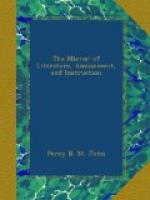“Pout your joined lips—then speak your kiss.”
If this were the present orthodox creed of kissing, it would most woefully spoil the sport of many a gallant youth, who, with the most polite officiousness, extinguishes (by pure accident of course) while professing to snuff, the candles, only that he may snatch a hasty, unobserved kiss of the smiling maiden, whose proximity hath so irresistibly tempted him. I wish the professor who hath already obliged us with a chapter on kissing, would lay us under greater and more manifold obligations, by a course of lectures on the same subject; and if I laid wagers, I would wager my judgment to a cockle-shell, that Socrates’ discourse on marriage did not produce a more beneficial effect than would his lecture; and that few untasted lips would be found, either among his auditors, or those whose fortune it should be to fall in the way of those auditors; but as it is at present, (for, alas! these are not the days of Polydore Virgil or Erasmus,) we are compelled, albeit somewhat grumblingly, to be content with but a very limited share of such blisses. Not that I doubt (heaven forbid that I should) the real inclination or the ability of at least the juvenile part of my fair countrywomen to be much more liberal than they generally are in this way; but, “dear, confounded creatures,” as Will Honeycomb says, what with the trammels of education and domestic restraint, they are prevented from appearing, as they “really are, the best good-natured things alive.” So much innocent hypocrisy, so much mauvaise honte, so many of “the whispered no, so little meant,” that they are practical antitheses to themselves. “Can danger lurk within a kiss.” But all fathers are not Coleridges, nor are all mothers Woolstonecrafts.




